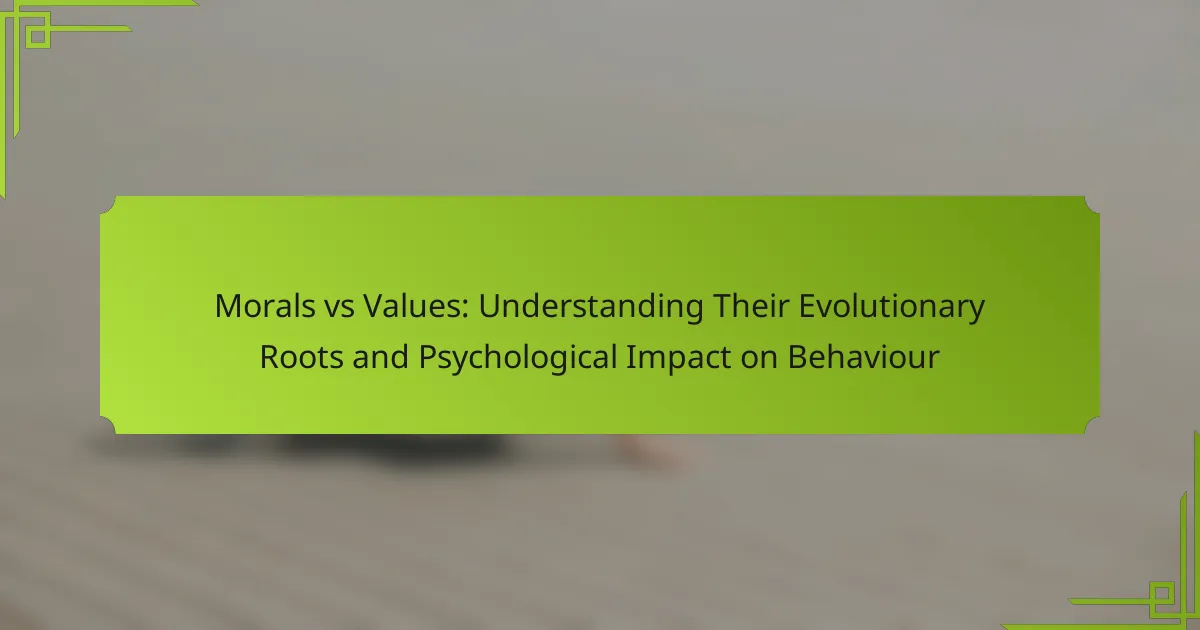Understanding the distinction between morals and values is essential for grasping human behavior. This article explores their evolutionary origins, the differences between universal morals and personal values, and their cultural and temporal adaptability. It also examines how these constructs influence decision-making and social interactions, highlighting the importance of moral reasoning and value alignment in everyday life.

What are the evolutionary origins of morals and values?
Morals and values have evolutionary origins rooted in social cooperation and survival. Early human societies developed moral frameworks to enhance group cohesion and promote altruistic behaviours, fostering trust and collaboration. This social bonding increased chances of survival and reproductive success. Psychological studies show that these moral systems influence behaviour, shaping individual decision-making and community dynamics. Understanding these origins reveals how deeply embedded these constructs are in human psychology and social interaction.
How do morals and values differ in psychological terms?
Morals and values differ in psychological terms primarily through their origins and influences on behaviour. Morals are often seen as universal principles governing right and wrong, shaped by cultural, societal, and religious contexts. Values, on the other hand, are personal beliefs that guide individual behaviour and choices, influenced by personal experiences and relationships.
Morals tend to be more rigid and can create social cohesion, while values are more flexible and can vary significantly between individuals. This distinction highlights the unique attributes of morals as collective standards versus the root attributes of values as personal guidelines. Understanding these differences is crucial for analysing behaviour in various psychological contexts.
What role do genetics play in shaping morals and values?
Genetics significantly influence the development of morals and values through inherited traits and predispositions. Research indicates that genetic factors can shape personality traits, which in turn affect moral reasoning and value systems. For instance, individuals with higher levels of empathy, often linked to genetic predispositions, tend to adopt more altruistic values. Additionally, evolutionary psychology suggests that moral frameworks may have developed as adaptive traits to enhance social cohesion and cooperation within groups. Genetic variations can lead to different moral interpretations, highlighting the complex interplay between biology and ethical beliefs.
What are the key genetic influences on moral reasoning?
Genetic influences on moral reasoning include heritable traits, brain structure variations, and neurotransmitter levels. Research indicates that genetics can shape empathy, altruism, and decision-making processes. For example, variations in the MAOA gene are linked to aggression and moral judgment. Additionally, studies show that individuals with specific genetic profiles may have differing responses to moral dilemmas, highlighting the complex interplay between genetics and morality.
How do environmental factors interact with genetics?
Environmental factors significantly influence genetic expression, shaping moral and value systems. This interaction occurs through epigenetics, where external stimuli modify gene activity without altering the DNA sequence. For example, social environments can enhance or suppress certain genetic predispositions, leading to variations in behaviour and ethical perspectives. Understanding this interplay sheds light on how humans adapt their morals and values based on cultural and environmental contexts.
What are the universal attributes of morals and values?
Morals and values universally encompass concepts of right and wrong, guiding behaviour and decision-making. They are shaped by cultural, social, and personal influences. Root attributes include consistency, which reflects how morals and values remain stable across different contexts, and adaptability, highlighting their evolution over time. Unique attributes involve the emotional resonance they generate, impacting individual and collective actions. Rare attributes may include the ability to transcend cultural boundaries, fostering empathy and understanding among diverse groups.
How do cultural norms shape common moral frameworks?
Cultural norms significantly influence common moral frameworks by shaping perceptions of right and wrong. These norms dictate acceptable behaviours and values within a society, affecting individual and collective decision-making. For instance, collectivist cultures often prioritise community welfare, while individualistic cultures emphasise personal freedom. As a result, moral frameworks evolve to reflect these underlying cultural values, highlighting the dynamic relationship between societal norms and morality.
What are the psychological benefits of adhering to morals?
Adhering to morals provides significant psychological benefits, including enhanced mental well-being and social cohesion. Individuals who follow moral principles often experience reduced anxiety and increased life satisfaction. This adherence fosters trust and cooperation within communities, leading to stronger interpersonal relationships. Additionally, moral behaviour can create a sense of purpose, contributing to overall happiness and fulfilment. As a result, the psychological impact of morals is profound, shaping behaviour positively and promoting emotional health.

What unique attributes distinguish morals from values?
Morals are often seen as universal principles guiding behaviour, while values are personal beliefs shaped by individual experiences. Morals typically focus on right and wrong, reflecting societal standards, whereas values are subjective and vary from person to person. Unique attributes of morals include their role in social cohesion and ethical frameworks, while values are distinguished by their personal significance and motivational impact.
How do personal experiences influence individual values?
Personal experiences significantly shape individual values by influencing perceptions and emotional responses. These experiences provide context for moral development, leading to unique value systems. For instance, childhood experiences often instil foundational values that guide behaviour throughout life. As a result, individuals may prioritise certain values based on their personal histories, such as empathy or resilience. This evolution of values reflects the psychological impact of personal experiences on behaviour and decision-making.
What are the implications of moral relativism?
Moral relativism implies that moral judgments are not absolute but are shaped by cultural, societal, and personal contexts. This perspective can lead to greater tolerance of diverse beliefs but may also challenge the establishment of universal ethical standards. The psychological impact includes potential confusion over moral choices, as individuals navigate varying moral frameworks. As a result, moral relativism can influence behaviour by promoting adaptability or contributing to moral ambiguity.

What are the rare attributes associated with moral and value systems?
Rare attributes associated with moral and value systems include cultural specificity, temporal fluidity, and contextual adaptability. Cultural specificity reflects how moral beliefs vary across societies, influencing behaviours and norms. Temporal fluidity indicates that morals and values evolve over time due to social changes or scientific advancements. Contextual adaptability highlights the ability of moral frameworks to shift based on situational factors, impacting ethical decision-making.
How do extreme moral beliefs affect behaviour?
Extreme moral beliefs can lead to rigid behaviour patterns and intolerance towards differing viewpoints. Individuals may exhibit heightened aggression or defensiveness when confronted with opposing beliefs. This behaviour stems from a strong identification with their moral framework, which can create an “us vs. them” mentality. As a result, social interactions may become polarised, fostering conflict and reducing constructive dialogue. Understanding these dynamics is crucial for addressing societal divisions and promoting empathy.
What are the psychological impacts of radical moral ideologies?
Radical moral ideologies can significantly impact psychological well-being and behaviour. These ideologies often lead to rigid thinking, intolerance, and social division. Individuals may experience heightened anxiety and stress due to the pressure to conform to extreme beliefs. This can result in decreased empathy and increased aggression towards those with differing views. Furthermore, the social identity formed around radical ideologies can foster a sense of belonging, but it may also lead to isolation from broader society. As a result, individuals may struggle with cognitive dissonance when their beliefs conflict with personal experiences or relationships.
What is the significance of moral dilemmas in understanding values?
Moral dilemmas are significant for understanding values as they reveal underlying conflicts and priorities in ethical decision-making. These scenarios challenge individuals to confront their beliefs and assess the importance of different values. By analysing moral dilemmas, one gains insights into how values evolve and influence behaviour. This exploration highlights the unique attribute of moral reasoning, which shapes societal norms and personal ethics. Engaging with moral dilemmas fosters a deeper comprehension of the psychological impact that values have on actions and choices in various contexts.

How do morals and values influence behaviour in everyday life?
Morals and values significantly shape behaviour in everyday life by guiding decisions and interactions. Morals often stem from societal norms and dictate what is considered right or wrong. Values reflect personal beliefs and priorities, influencing choices and actions. For instance, a strong value placed on honesty may lead to transparent communication, while moral beliefs can dictate responses to ethical dilemmas. Understanding the interplay between these elements is crucial for recognising behavioural motivations.
What are the psychological mechanisms behind moral decision-making?
Moral decision-making involves cognitive processes influenced by evolutionary psychology. These mechanisms include empathy, social norms, and moral reasoning. Empathy fosters emotional connections, guiding individuals toward altruistic behaviour. Social norms establish collective expectations, shaping moral choices. Moral reasoning enables critical evaluation of ethical dilemmas, balancing personal values against societal standards. Understanding these mechanisms reveals their impact on behaviour, highlighting the interplay between innate tendencies and cultural influences.
How can understanding morals and values improve interpersonal relationships?
Understanding morals and values enhances interpersonal relationships by fostering empathy and trust. Recognising shared values creates connections, while understanding differing morals allows for respectful dialogue. This awareness can lead to improved conflict resolution, as individuals appreciate diverse perspectives and motivations. Ultimately, a strong moral foundation supports healthier interactions and deeper bonds.

What best practices can enhance moral reasoning and value alignment?
Enhancing moral reasoning and value alignment requires intentional practices. Engaging in reflective dialogue fosters understanding of diverse perspectives. Encouraging empathy can strengthen connections to shared values. Incorporating ethical frameworks guides decision-making processes. Practising mindfulness aids in recognising biases that may affect moral judgments.
What common mistakes should be avoided in moral decision-making?
To avoid common mistakes in moral decision-making, individuals should focus on critical thinking and self-awareness. Over-reliance on emotions can cloud judgment, leading to biased decisions. Additionally, failing to consider the long-term consequences of actions can result in regret. Ignoring diverse perspectives limits understanding and can reinforce harmful biases. Lastly, neglecting the context of a situation may lead to inappropriate moral conclusions.
How can individuals cultivate a stronger sense of values?
Individuals can cultivate a stronger sense of values by engaging in self-reflection and aligning their actions with their beliefs. This process often involves examining personal experiences and societal influences that shape one’s moral framework. Practising empathy enhances understanding of diverse perspectives, reinforcing personal values. Setting specific goals to embody these values in daily life further solidifies commitment. Engaging with communities that share similar values can provide support and accountability, fostering a deeper connection to those principles.
